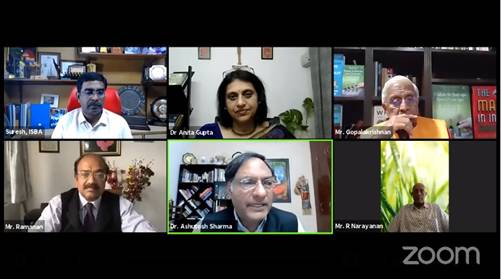Secretary, Department of Science and Technology (DST) Professor Ashutosh Sharma emphasized that startups should have good balance between energy and experience at a fireside chat titled ‘Leadership series: Wisdom for Startups from Grownups.
“Mentors play a big role, and startups and incubators should not be shy of gaining knowledge from the experienced persons. In India, there is no lack of ideas. I have met numerous people who have ideas, but they are lacking confidence. We need to provide that confidence to them through adequate support to help them stand on their own feet”, Professor Sharma said at the online Leadership Series ‘Wisdom for Startups from Grownups’, jointly organized by Indian Steps & Business Incubators Association (ISBA) and National Science & Technology Entrepreneurship Development Board (NSTEDB), DST.
Professor Sharma advocated for ease of doing business, inclusion, equity, and diversity. “It is also about learning and working with diversity. Working together brings the sustainability of knowledge. The startup movement has to pick up steam and transform along the way into market opportunities,” he added.
He said that the time has come for startups, and they have to play a big role in the development and progress of country looking at the future. He hoped that in the next five years, there would be huge number of startups as the country moves towards becoming ‘Aatmanirbhar Bharat’. He stressed on finding ways to make more and more women become part startups and incubators movement.
Professor Sharma highlighted the various steps taken by the government to encourage startups and incubators. “SAATHI centres set up by DST for MSMEs provide high-end scientific infrastructure, and access to these have been made very easy and transparent. Eighty percent of time is kept for these machines for startups at appropriate prices,” Professor Sharma said. He also underlined policy changes brought about for liberalization and democratization of geospatial data and spoke about the Science Technology and Innovation Policy (STIP) which has been brought into existence after wide consultations from various sectors.
Several eminent speakers elaborated on various issues related to the journey, growth, and problems of startups and incubators.
R. Ramnam, Mission Director, Atal Innovation Mission, NITI Aayog, said that India is on the cusp of becoming one of the countries with the fastest increasing number of startups in the world, and our focus should be on how we can become a nation of job-creators and not job-seekers.
“There should be willingness to keep learning. Leadership quality is same for all organizations, and the essence is to create a bunch of people who want to follow you,” said R. Gopalakrishnan, former Executive Director, TATA Sons, author and Corporate Advisor.
R Naru Narayanan, Angel Investor & Mentor, said, “Startups are still at the formation stage and should seek to create long-lasting organizations”.
“Startups and incubators have come up of age this has been possible because of the power of technology, innovation, and collaboration,” said Adviser and Head NSTEDB Dr Anita Gupta at the programme, which was attended by several representatives from the start-up and innovation ecosystem.

